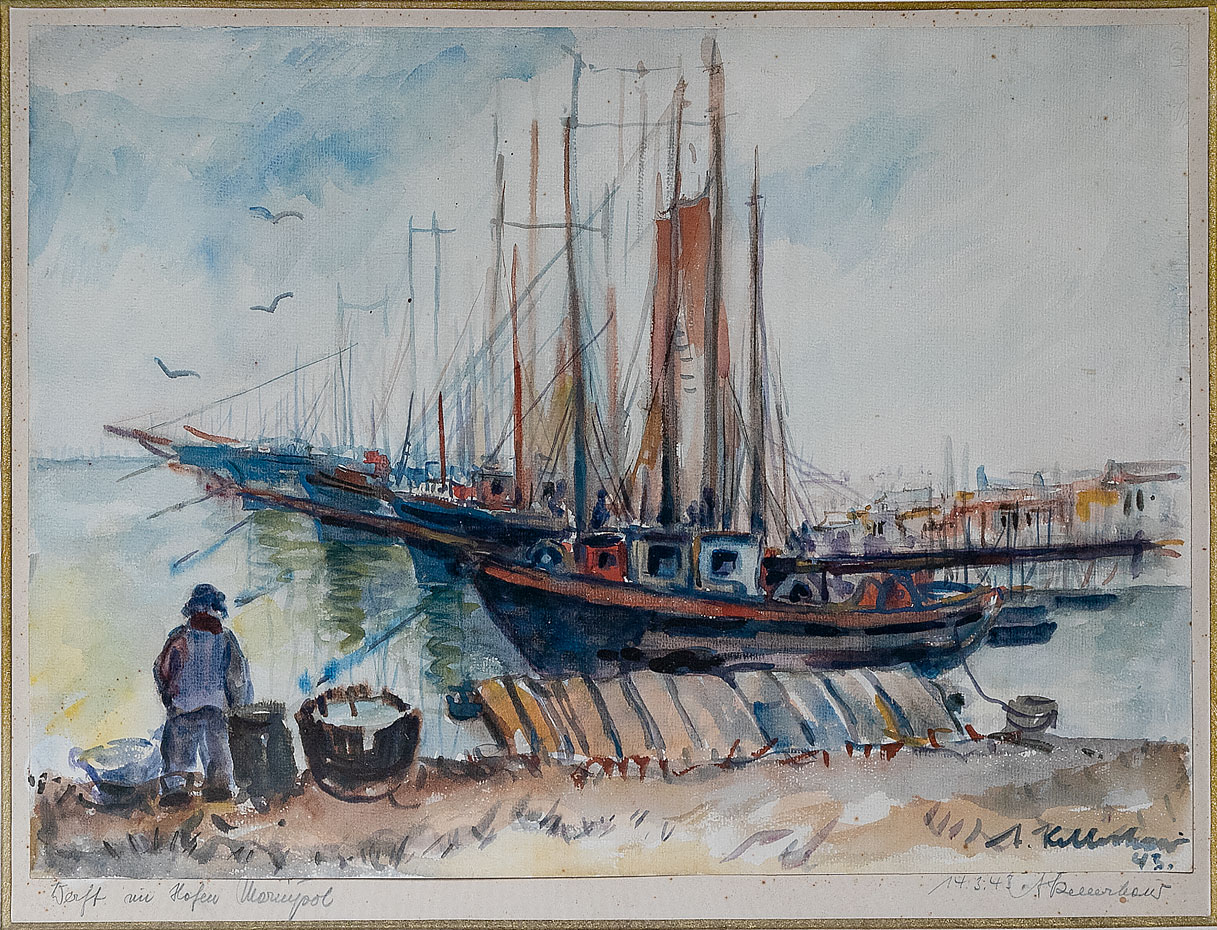They were always there. The paintings, sketches and a pair of small Christian Orthodox icons that seemed strangely out of place. Ever since my widowed grandfather found himself a new companion, his children and grandchildren, myself included, would get invited to her house for various family reunions. Sitting at the dining table in her parlor, we found ourselves surrounded by an artwork collection that would always, at some point, become a topic of conversation.
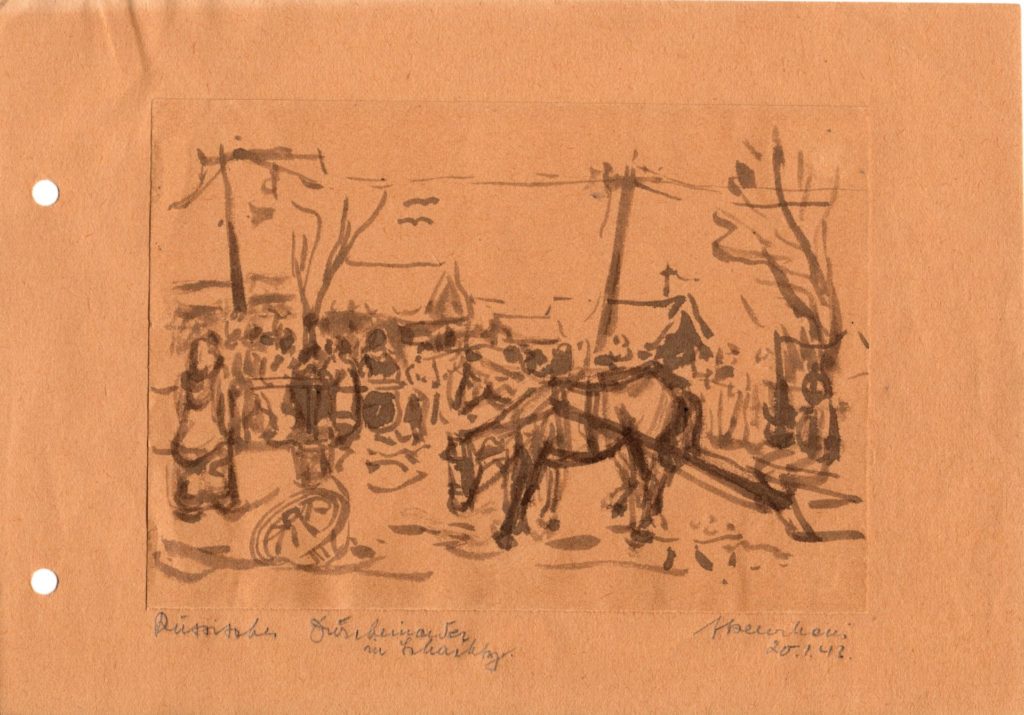
Some watercolor paintings depicted bright summer streets in the southwest of France, but many more came from vastly different places and stood in stark contrast to those holiday scenes. They showed mostly women and children with an air of misery about them, an impression reinforced by a striking black-and-white sketching technique. To be sure, no undiscovered Picasso had been at work here, but the artist clearly knew what he was doing: portraits, landscapes, cityscapes, even a few battle scenes. German infantry in positions near Sevastopol on the Crimean Peninsula. Fighter planes attacking some ship. A painter at war? A painting soldier? These images were as inscrutable as they were fascinating.
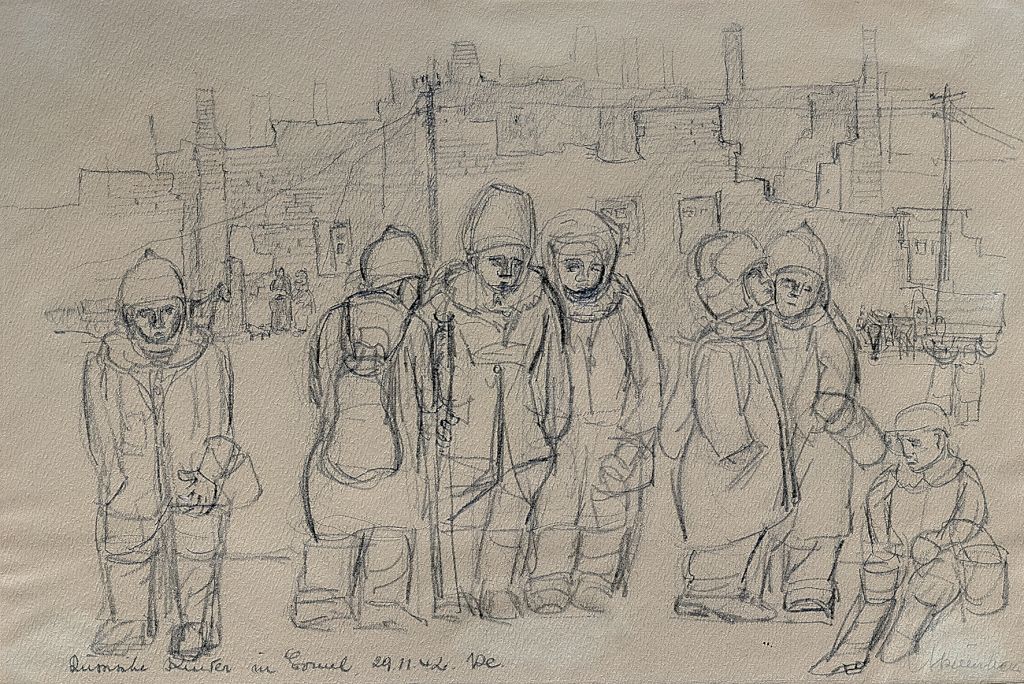
As it turned out, Ulla, my soon-to-be new grandmother, couldn’t offer much in the way of an explanation. We knew that the artist was her own father, Anton Kellerhaus, a skilled painter who was drafted into Hitler’s army. For simplicity’s sake, and because it’s pretty much his German nickname, I’ll just call him Tony here. He served in the Soviet Union, including parts of Russia and Ukraine — though it was more common in West Germany to refer to this area collectively as Russia and Russian — and perished when Ulla, his first-born daughter, was only 4 years old. Growing up during the late 1940s and early 1950s, she found herself alone with a baby sister and her mother, who would promise the girls their father’s return for quite some time before she eventually gave up on him. Therese Kellerhaus had her husband declared dead five years after the war and never remarried. That, and the fact that Tony’s last letter to her was dated Aug. 15, 1944, was about all we knew for sure. Otherwise, details were vague. The circumstances and even the place of his death were unclear. Uttering the words “missing in Russia” worked like a spell that rendered all further questions pointless. Everything about this missing man seemed to confirm what a German military leader had pointed out long ago. “Russia is so vast, she would swallow the largest army.” Tony had belonged to one of them.
Still, there was a story here, and as I happened to be the family’s freshly minted historian of Eastern Europe, I found myself called upon to do something about it, even though nobody would say it aloud and expectations seemed generally low. After all, that parlor-decorating artwork had been there for a long time, and the documents he left had been stowed away by Ulla in two binders marked “Letters from my father.” There was no hurry, especially since nobody else could get to them. But that all changed on Feb. 24, 2022.
When Russian President Vladimir Putin unleashed his armies on Ukraine, failed to capture Kyiv and redirected them to the Donbas area, Tony’s letters and sketches from Mariupol turned our family history project into a matter of current affairs. “In Ukraine,” he wrote in February 1943, “everything is really, totally different from the rest of filthy Russia. … A completely different people that has nothing at all to do with the other Russians appears to have settled in this place. It would be tragic if we could not put a stop to the Russians’ advance here, but what is one to do?”
Yes, what indeed? Tony’s blatantly racist remark on Russia aside, he must have gained an insight that prompted this comparison. Finding how a German soldier’s ideas about the enemy country and its people evolved may radically change the way we look at their war against the Soviets and provide a historical lens on the conflict inflicted on the area today. The German army had been called upon to fight a war of annihilation against a state that was home to an “inferior race,” and we have come to imagine them with an ideology-infused, murderous mindset that goes a long way to explain the horrors of this most devastating of land wars. This is all true, yet if Tony’s letters are anything to go by, there appears to have been more to their experiences.
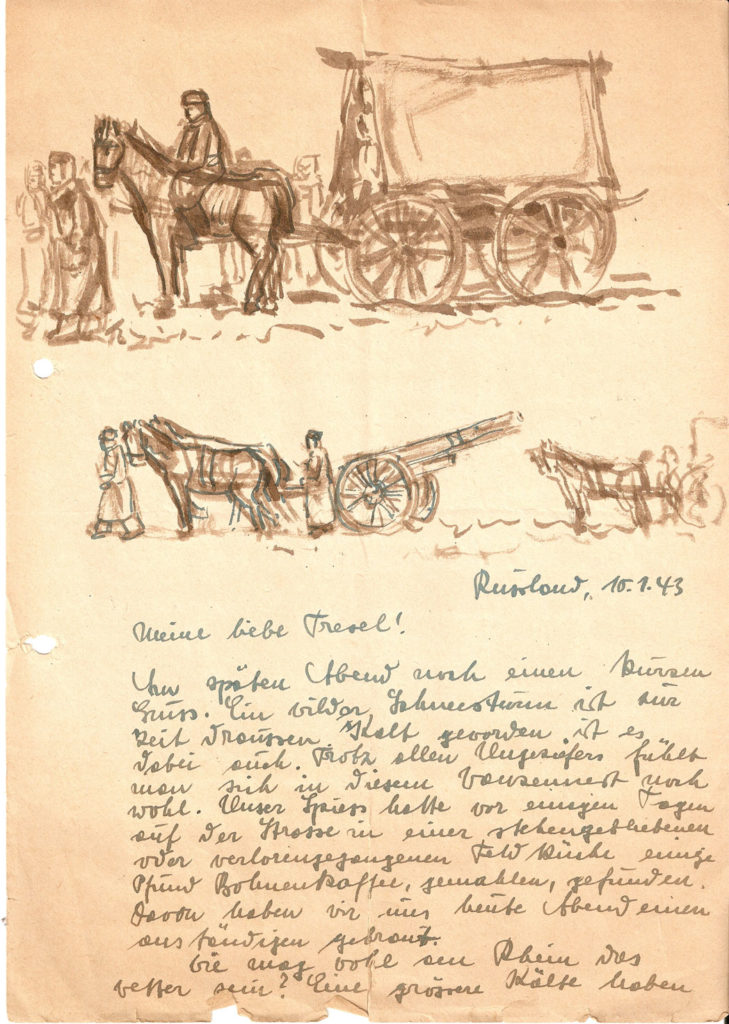
I’ll try to accompany Tony on his way to Mariupol, to understand what informed his statement about Ukrainians and Russians. The port city had taught him something in the spring of 1943. It made him conscious of Ukraine’s existence as a separate, if somewhat amorphous, entity in its own right. For reasons completely unacceptable to us today, he found Ukraine worth fighting for but had to ask himself if there was any real chance of success against the Russian army. Looking at how the German-Soviet war had reached a critical stage in the Donbas in early 1943, I find it striking how some of his thinking has echoes in deliberations about Russia’s current war on Ukraine and can’t help but wonder if there is a forgotten lesson here.
When Tony was drafted late in 1941, Hitler’s war had been going on for a while, and going well — mostly, anyway. Poland was conquered. Denmark, Norway, Belgium and the Netherlands were occupied, along with tiny Luxembourg for good measure. The defeated even included France, the power Germany had feared the most after suffering defeat at its hands in 1918. Meanwhile, Great Britain stood alone, the Soviet Union was reeling from the German attack, and the United States was not quite in the war yet. So far, Tony’s family had made it through without a scratch, even though all four of his brothers had been sent to one front or another. They must have felt a sense of elation, especially since they were very much in line with those who had brought about this string of victories: Four of the five brothers had joined the Nazi Party, Tony among them, and there is no doubt whatsoever about his enthusiasm for, and support of, Adolf Hitler at this time.
He probably got an earful about it from the young woman he was wooing at the time, though. Therese’s feet were firmly planted in the camp of the Catholic Church, and she had befriended at least one Jewish girl in Vallendar, her hometown on the Rhine River. Judging from what Tony would write to her and from her own diary, she must have been appalled at how the Nazis treated the Jews and sneered at her beliefs. But her occasional grumbling was dismissed by those closest to her — her mother, her sister and her brother-in-law would all follow Tony in joining the party. Worst of all, members of the local party picked her late father’s restaurant (in her parents’ house) as the place to meet in Vallendar. I cannot be sure how this affected the young couple, but apparently there is a limit to how politics can affect someone’s personal life. After all, Tony was handsome and, if his letters are any indication, a lot of fun to be around. And maybe his professional specialty — church painting — made her think that he would come around to her point of view yet. In October 1938, she agreed to marry him, a few days before Vallendar’s synagogue was burned down. By 1941, Therese had given Tony two baby daughters.
Their joy was dampened when Tony was drafted late that same year, but the young couple tried to deal with that as best they could. Therese managed to visit Tony several times in the city of Detmold, where he received basic training from the air force. He would bask a little in the aura of Germany’s most spectacularly modern weapons branch and wore the Luftwaffe’s winged insignia with noticeable pride. Tony did reasonably well at training, turning out to be a good shot. What was more, at age 33, he stood a decent chance to avoid becoming frontline material. His first assignment in occupied France — Bordeaux no less! — was a location German soldiers learned to appreciate for a variety of reasons. Tony may have let on more about this than his wife wanted to know: His idea to send home a picture of himself next to a French girl was certainly less than brilliant and caused ripples that would follow him all the way into the Soviet Union. It is hardly surprising that his paintings from August and September 1942 exude the atmosphere of a spectacular summer vacation. He was in for a rude awakening.
The summer before, Hitler had ordered his armies to attack the Soviet Union, which had been his principal target all along. Their spectacular early successes notwithstanding, the cost had already been horrendous and kept mounting. Losses in men and materiel needed replacing, and less well-trained divisions were ordered east. Tony was assigned to one of them on his journey from the southwestern tip of German-occupied Europe to the outer reaches of the eastern front. In October and November, Tony and his comrades received further training at a large military compound the Germans had taken from Poland some 60 miles northwest of Warsaw. They were heading in the general direction of Stalingrad (now Volgograd), on the Volga, but they wouldn’t make it.
The journey by rail and road seemed endless to him. “It’s been eight days that we’ve been on the move,” he complained to his wife in early December 1942 from Debaltseve, a railway hub in the Ukrainian Donbas, and enumerated some of the way stations he knew she would find on a map: Minsk, Bryansk, Kursk, Kharkiv. Still, he had to put three telltale question marks when it came to his destination. So far, he was shocked by what he saw from the train and around the railway stations they stopped at. Impoverished people, often against a backdrop of ruined city skylines, seemed to confirm every sarcastic jibe Nazi propaganda had ever broadcasted about the Soviet “worker’s paradise.” That did little, however, to alleviate his fears of entering an alien realm whose language and culture he did not understand.
Moving east across the Donets some 160 miles downriver from Severodonetsk, they were forced to find quarters where they could, hammering on doors of peasant huts and forcing the inhabitants to share whatever space was available. By Tony’s account, careful gestures of hospitality were offered and accepted, somewhat distrustfully, while any meaningful conversation was impossible. Still, there appears to have been no major trouble beyond the lack of hygiene and overcrowding many German soldiers lamented. Tony remained curious, and with an amateur ethnologist’s eye, he would spot what he thought was a Christmas tree in December and wonder about children going from house to house and receiving small gifts from the inhabitants in early January. Understanding what the Soviets were up to would get easier in and near big cities, where more people would speak some German. Tony’s unit took a severe beating before getting close to one of them.
By December 1942, Tony and his comrades must have been aware of the trouble the 6th German army was in at Stalingrad, and it would not take long for them to understand that they were at the sharp end of the Red Army’s winter offensive, with little or no means to stop it. By all accounts, Tony’s division arrived in the east dashing in appearance and reasonably well equipped, but its soldiers were still inadequately trained and had no more combat experience than its officers. When a Soviet tank attack shattered it beyond repair on a tributary of the mighty Don River, the division’s remnants were haphazardly attached to other units and beat a hasty retreat. With the Red Army in pursuit, they barely made it to Shakhty, a mining city in the Russian part of the Donbas, which by then had been in German hands for half a year, and shocked Tony once more, if only because the power plants were blown and there was no water or electricity for a city of well over 100,000 people. But while he waited for three weeks to be reassigned, he reached a surprisingly benevolent conclusion about his stay, especially in comparison with the first shocked impression he sent home to his wife. “We will never forget the time we spent here, and we have seen a lot that helped us form an opinion of our own on Russia,” he wrote at the end of January 1943, shortly before the Germans abandoned the city. They moved west to take up defensive positions in the southwestern part of the Donbas. For Tony that meant retreating past Taganrog, Anton Chekhov’s birth city, all the way into Ukraine, to Mariupol on the Azov Sea.
The port city was second only to Odesa in size and importance, and it made an immediate impression on him. “From a hill,” he wrote, “we could see heavy industry and large shipyards. … We had a marvelous view of one part of the city and of the adjacent sea.” Although he was billeted in a smaller city a few miles west, Tony ventured into Mariupol on several occasions, making time to sketch and paint in the harbor area. A bay, inked in black and white, with what seems like an industrial site may very well show parts of the Azovstal steel plant now famous for the so-called rain of fire Russia recently dropped on it. But the scenes were very different when Tony was there: I would have placed his colorful water painting of boats somewhere in southern France had he not scribbled “Shipyard at Mariupol port” underneath, dating his work March 14, 1943.
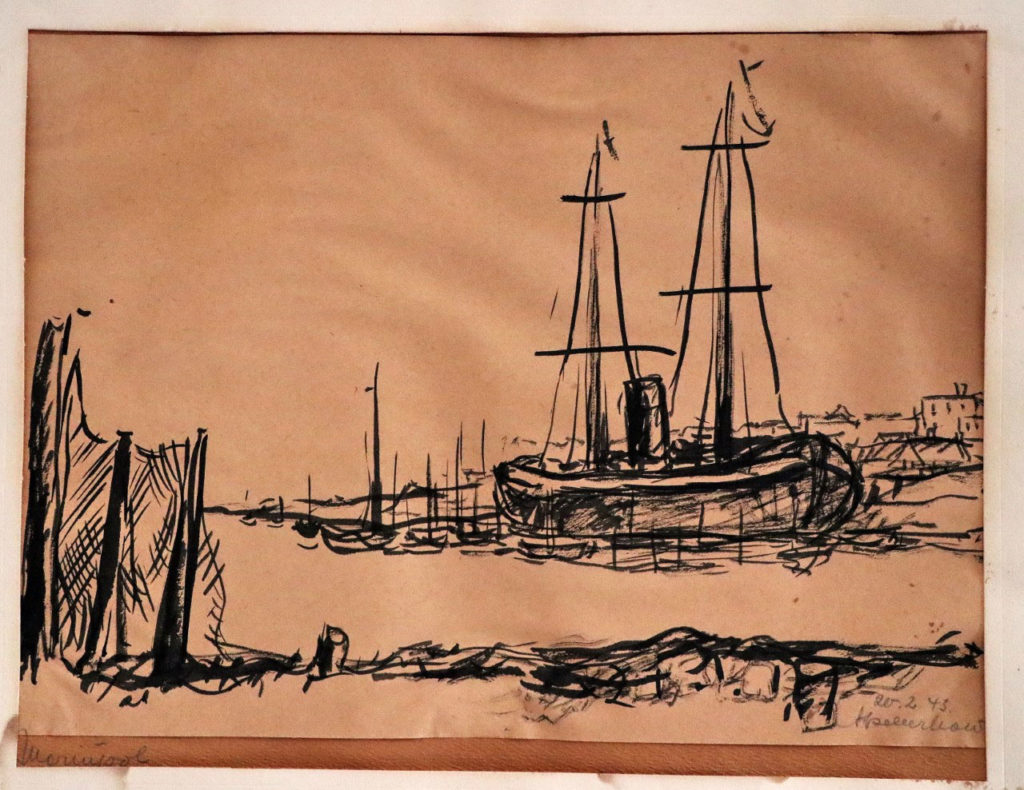
The contrast with the impressions he sent home from Shakhty couldn’t have been more striking. Of course, the Russian mining city had been on the front line the entire six months the Germans were able to hold on to it, and in the midst of winter, it offered few, if any, inherent charms to match Mariupol’s maritime flair. Tony’s sketches in Shakhty showed, by his choice, that he was a witness to war and German occupation: Aside from the teacher’s family he was quartered with, he drew mostly allied Romanian soldiers and Soviet prisoners of war and didn’t comment on either of them in his letters.
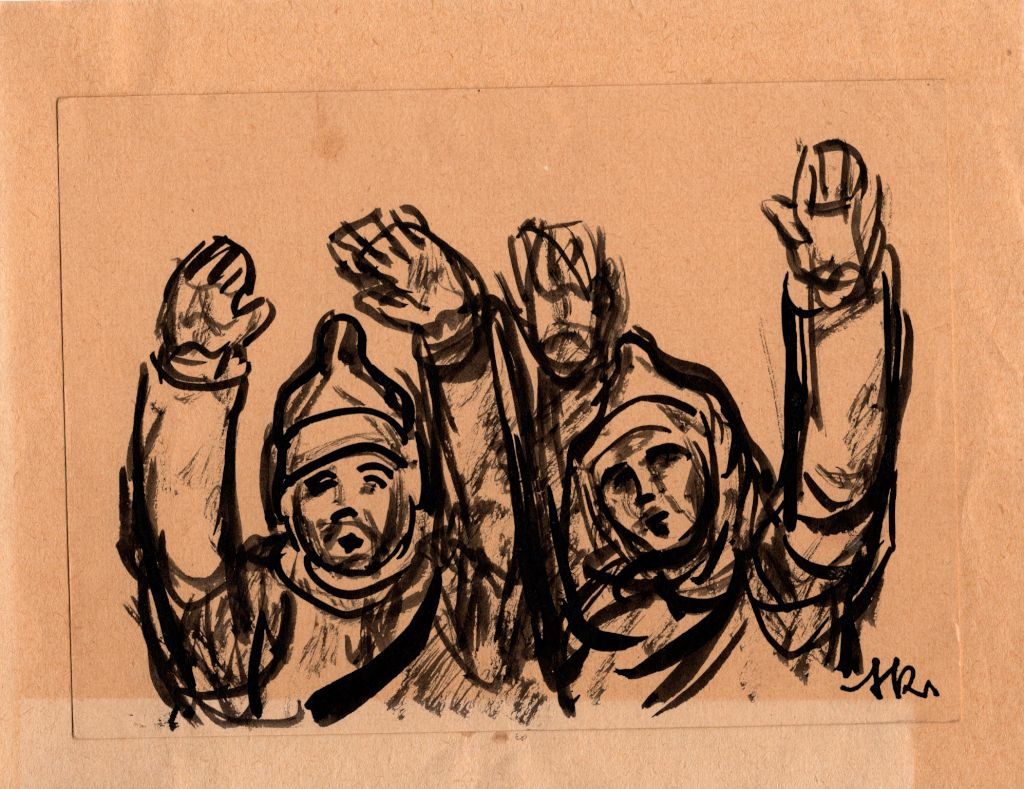
Mariupol, on the other hand, had been in German hands for about 18 months, and their rule was under no immediate threat. It comes as no surprise that Tony would try to find something approaching peaceful normalcy there. He would not see the anti-tank ditch where the Germans had murdered and interred the city’s Jews, some 8,000 people, in October 1941, and did not notice, apparently, the ongoing deportation of tens of thousands of Ukrainians to forced labor in Germany. “The sun shines gloriously on this city on the Azov Sea, and spring is coming with a vengeance,” he would write in March 1943. “Like boisterous children, my friend Kurt and I ran through the city, just because we wanted to see some life and order after all these weeks in small and tiny dumps. You wouldn’t believe how happy we were to see that there is some human order left. … one even sees civilians.”
Tony was also astonished by the country’s natural riches. Upon arrival in Shakhty after weeks of traveling through Russia, he failed to understand why Germany would even want to lay claim on this land. “Nobody wants to stay here; everybody would rather break rocks in Germany,” he exclaimed, puzzled and incredulous. But fighting over Ukraine made much more sense to him: “Seeing the endless fields, vast fruit plantations, the cattle, mills and farms, one can comprehend just how abundant this source of food is, and what it could become under our management. Simply everything is here: rye, wheat, corn, all vegetables, eggs, butter, poultry, venison, coal, ores, simply everything we need to feed us and for our economy.”
If this was under the command of Moscow, he seemed to think, it clearly did not — should not — belong with it. Tony was perfectly at ease with imagining this land as some sort of colony and having its people work for Germany.
But there was also something else: Beginning in Shakhty, he found it increasingly difficult to see enemies in the people he met.
This became noticeable when he encountered Russians who understood and spoke German. In the mining city, an accidental meeting between a German sergeant and a local girl led to a piano night at her mother’s house, with several soldiers, junior officers and friends of the family — all women — attending. The Germans brought a gramophone, of all things some Wagner records, and food, which the host served with black tea, vodka and a rye pancake. Tony didn’t really like it but ate “for decency’s sake.” While one soldier played the piano they had discovered earlier and a woman from the local theater sang along, Tony learned that the host’s husband, a doctor, had been away at war two years already, and his family had no news from him. He wouldn’t elaborate on it, perhaps troubled to recognize a familiar situation.
As early as February 1943, on the move between Russia and Ukraine, he would confide to his wife: “We have always tried to strike up a conversation in many different quarters we have been, trying to learn how people felt and what opinions they held. Everybody is against the war, and most of them are, without a doubt, well-disposed toward us. Their suffering is the same as ours. In the place we are now, the daughter speaks excellent German. She just said that she and her parents only wish for us to get home in good health. Two of her own brothers, one with four kids, the other … with two, have been away at war two years already, and they haven’t heard from them since. I’ll have to tell you the details one day; I just can’t write about it.”
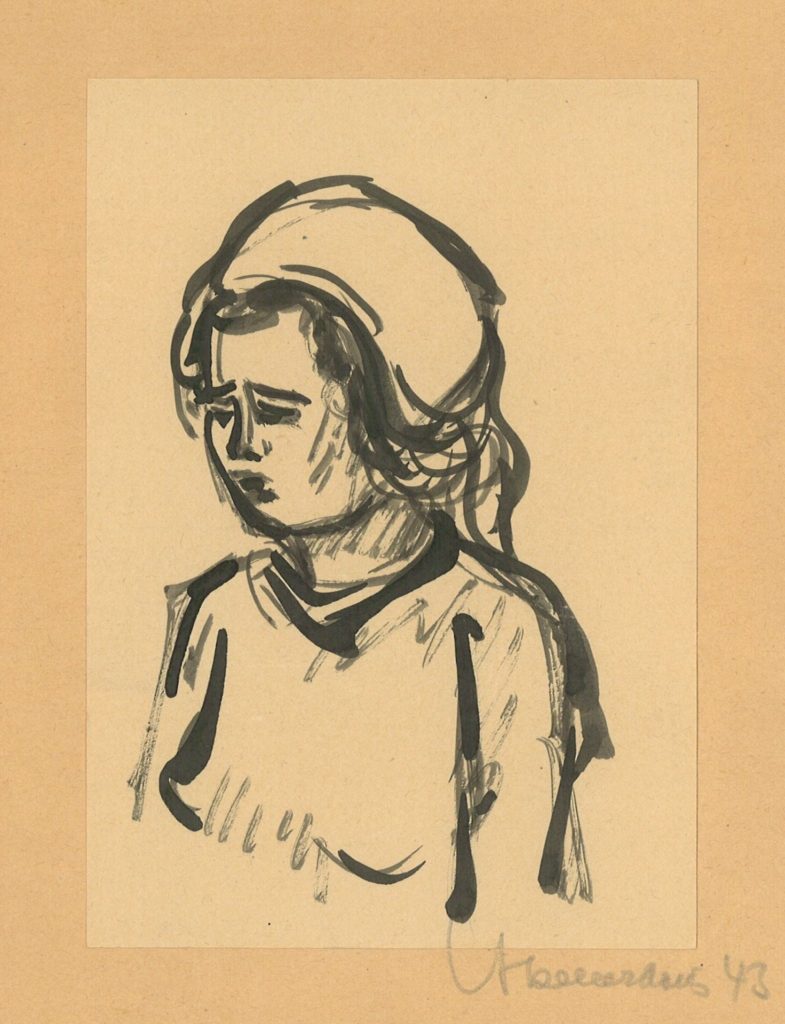
On the Azov Sea, he encountered people who had suffered at the hands of the Soviet state. Surprised to discover that the family he moved in with near Mariupol identified as Greeks whose ancestors had settled here 200 years before, he was shocked to hear that they had been victims of the Stalinist purges and repression of the national minorities. “Bolshevism” had banished men young and old to Siberia, he wrote, and “there is a woman here who was in Siberia for eight years. From every house in this town, there is at least one in Siberia, horrible circumstances.” In short, these people seemed to be deserving of protection, especially since they seemed to have treated the German soldiers in their house with exceptional care. It must have been a nice place, too: Tony, always with an eye for design, paid it the ultimate compliment in pointing out that the average German lodging would have been no match for it in tastefulness and tidiness. It was here, on the western outskirts of Mariupol that Tony wrote, with a considerable sense of urgency, that “the Russian needed to be stopped here.”
Then as now, that was easier said than done, and by spring 1943 he knew that. While he hadn’t seen the German army’s catastrophic defeat in Stalingrad, he had barely made it out alive when his own division was wiped out, mostly thanks to his somewhat belated arrival on the scene and to the less exposed job he did in his unit’s orderly room. The Germans were on the retreat now, and while bad planning, challenging logistics and generally adverse conditions had something to do with it, that wasn’t all it was. Soldiers on the ground felt that their adversary was growing stronger, while they were not. Captured soldiers or pilots may have been in bad shape, and their equipment may not have been state of the art, but Tony started to doubt if that actually meant anything in the long run, especially since the Soviet soldiers did not strike him as being as listless and incompetent as he had been led to believe. “We have misjudged them time and time again,” he wrote in late March 1943, showing signs of desperation. “We must beat the Russian this summer, or else! We need to think of something new. He has learned too much from us already, and he’s just doing everything the way we do. The masses of people at his disposal and his short supply lines work to his advantage.”
Hitler’s war on the Soviet Union had reached a tipping point. When the Germans moved into defensive positions in the southern Donbas along the eastern shores of the Azov Sea, they had lost a whole army at Stalingrad but managed to pull back from the Caucasus, cutting their losses and gearing up for one last-ditch offensive effort, while the Red Army, exhausted by their winter offensive, was winding down.
The German attack effort that Tony was hoping for was finally undertaken in the summer of 1943. It was a failure, and there was no more holding back the Red Army. It sliced through makeshift German defenses in the Donbas and reached the Dnieper River by autumn. Back then, this is what had to happen, as Nazi Germany needed to be defeated. Today, as Putin attempts to cast independent Ukraine as a new Nazi threat to Russia’s position and tries to present his invading army as the legitimate successor to the victorious Red Army, leaders in the West are unanimous in their conviction that he cannot — must not — succeed. In this eerie reversal of roles, they would agree with Tony that Russia needs to be stopped, even though he was in the worst possible position to utter such a statement and said it for all the wrong reasons. His admiration for Ukraine’s natural resources was a thinly veiled endorsement of Hitler’s idea that the German people had to conquer “living space” for itself, and while his compassion for the Azov Greeks near Mariupol was genuine, they were clearly a welcome justification for a war effort that was otherwise utterly indefensible.
Today, good reasons for “stopping the Russians” and aiding Ukraine are easy to come by: matters of principle, atrocities against the Ukrainian population, international law and security politics. Given the effect Russia’s grip on Ukraine’s grain harvest and trade routes appears to have on the world’s food supply, it has even become painfully evident that classic reasons for waging war have not lost all meaning.
“But what is one to do?” Part of Tony’s sense of helplessness came from his surprise at the Soviets’ resilience and their will to fight, which Germany, even with its materiel superiority, could not match in the long run. He is hardly to blame for his misjudgment. It was common at the time, not only among the Nazi leadership and the German High Command, but also among most, if not all, European governments. The Germans were confident they would win in 1941 and 1942, and even their catastrophic defeats at the turn of that year barely dented their confidence in early 1943. They were convinced that they were up against a generally inept opponent they had beaten before, a state in disarray barely deserving of that name. By the end of 1943, they began making much of minor defensive successes, and not much more than a year later, German forces in the east were, for all practical purposes, wiped out.
That observation makes me nervous, especially as few seem to be taking this experience into account. To be sure, the Soviets were not alone when they won, while Putin’s Russia appears to be isolated in Europe — if less so globally. The Soviets received extensive aid from their Allies, while Putin appears to have burned through most of his modern weaponry already and is scrambling for fighters and materiel.
But there are parallels. Back then, the Germans remained generally unimpressed by the Soviet soldier’s tactical skills, in a way that has echoes in recent observations of the Russian army’s blundering toward Kyiv. We have heard a lot about how Putin began his invasion based on wrong assumptions resulting from faulty intelligence, about logistical incompetence and a carelessness for the lives of his own soldiers, things that both the Tsarist and Soviet armies were infamous for. We hear that he cannot possibly go for all-out mobilization because his people would notice that they are actually at war. And with the Ukrainians handling themselves so well, gearing up for a counteroffensive even, Putin seems doomed to fail. But is he really? Putin strikes me as determined, and the Russian army is learning, as much as we may hate its ambitions. And ultimately, mass does matter. Tony found that out. Yes, “it would be tragic if we could not not put a stop to the Russian’s advance,” as he put it. But doing that will require more than a trickle of advanced weaponry. We need to stop thinking that Russia is at the end of its tether.
In the final analysis, it was that erroneous assumption that killed Tony. He wrote a lot about his guardian angel doing an astounding job whenever given the opportunity. Tony made it out of the Donbas in the summer of 1943, only to be reassigned once more, this time to an army division that was supposed to hold the Crimean Peninsula in April 1944. He survived again, under circumstances that defy all belief, and made it to Romania’s Black Sea coast. The remnants of his unit were eventually destroyed on the Dniester River in August 1944, in the Soviet assault on Bessarabia, an area then annexed to Romania. His body was never found.



